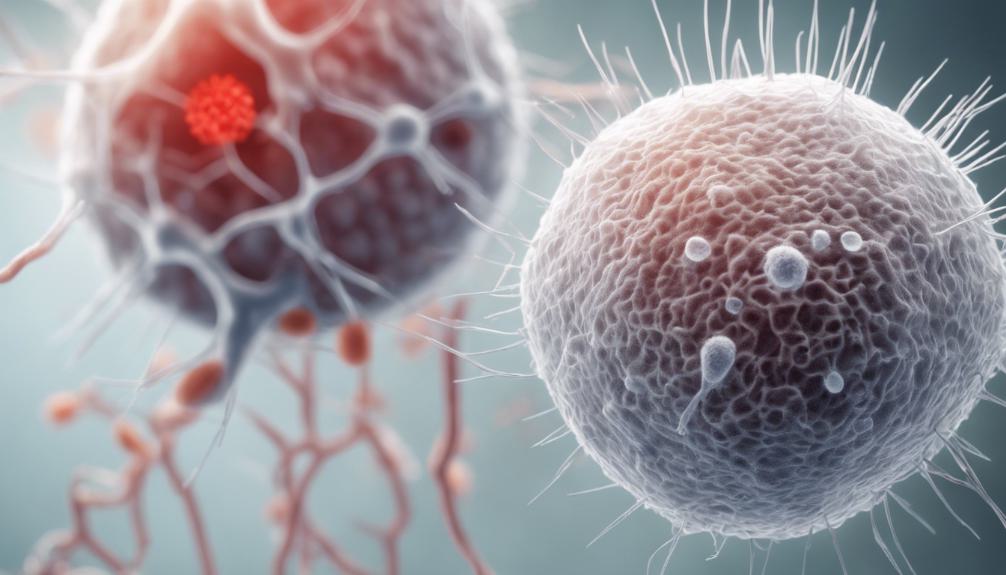Hairy Cell Leukemia Lawsuit
We've been following the ongoing legal battles and research surrounding the alleged link between Roundup, a widely used herbicide, and certain types of cancer, including hairy cell leukemia. It's a complex issue that raises significant questions about consumer safety, corporate responsibility, and the adequacy of regulatory oversight. As we navigate through the intricacies of these lawsuits and the science behind them, we find ourselves at a critical juncture. The implications of these findings could not only influence future legal actions but also potentially reshape our approach to product safety and public health. Join us as we uncover what lies beneath the surface of this important issue.

Understanding Hairy Cell Leukemia

Before diving into the lawsuit, it's crucial to understand that hairy cell leukemia is a rare type of blood cancer affecting the body's white blood cells. This condition can significantly impact an individual's immune system, making it harder to fight off infections. We've found that those diagnosed with hairy cell leukemia often face a series of challenging symptoms, including fatigue, easy bruising, weight loss, and frequent infections, which can severely impact their quality of life.
Understanding this type of leukemia is important because it sets the stage for why someone might pursue legal action if they believe their illness is linked to external factors. It's not just about the medical diagnosis; it's about how this diagnosis alters lives. Patients often undergo treatments such as chemotherapy, which, while effective, can have their own set of challenges and side effects.
We're aware that navigating through this disease is an uphill battle not only medically but emotionally and financially as well. That's why it's essential for us to shed light on all aspects of hairy cell leukemia, providing a comprehensive background that underscores the importance of the ongoing lawsuits.
The Link Between Roundup and Cancer

Understanding the complexities of hairy cell leukemia sets the groundwork for exploring how exposure to Roundup, a widely used herbicide, has been linked to an increased risk of cancer. We've delved into numerous studies and reports, piecing together evidence that suggests a troubling connection between Roundup's active ingredient, glyphosate, and the development of various cancers, including hairy cell leukemia.
The scientific community remains divided, but we can't ignore the mounting evidence that points to glyphosate as a potential carcinogen. The International Agency for Research on Cancer, part of the World Health Organization, classified glyphosate as "probably carcinogenic to humans" based on evidence from studies in humans, animals, and in vitro. This classification has sparked a global debate and prompted us to take a closer look at the risks associated with prolonged Roundup exposure.
Our investigation into the link between Roundup and cancer reveals a pattern of concern. Individuals with prolonged exposure to glyphosate, especially agricultural workers and gardeners, appear to be at a higher risk of developing hairy cell leukemia and other types of cancer. This correlation raises serious questions about the safety of widely used herbicides and the need for stringent regulatory measures to protect public health.
Legal Actions and Precedents

In light of the concerning evidence linking Roundup to cancer, numerous individuals have taken legal action, setting significant precedents in the process. We've seen a wave of lawsuits against Monsanto, Roundup's manufacturer, with plaintiffs alleging that exposure to the weedkiller contributed to their development of hairy cell leukemia and other types of cancer. These legal battles have not only highlighted potential public health risks but also raised questions about corporate accountability and the safety of widely used agricultural products.
One landmark case resulted in a substantial jury verdict for the plaintiff, demonstrating the potential for success in these lawsuits. It's encouraged others who've suffered similarly to step forward, armed with the belief that justice can be achieved. We've watched as these cases have accumulated, each contributing to a growing body of legal actions that seek to hold Monsanto accountable.
These precedents serve as a beacon for those contemplating their own legal journey. They underscore the importance of holding corporations responsible for the safety of their products. As we look at these legal actions, it's clear they're not just about compensation; they're about advocating for safer practices and ensuring that future generations are protected from potential harm.
Preparing Your Lawsuit

We're gearing up to take legal action, and the first step involves thoroughly documenting any exposure to Roundup and its connection to your health condition. It's crucial we gather all available evidence, which includes medical records, purchase receipts of Roundup, and any documentation that can help establish a timeline of exposure. This evidence will form the backbone of our lawsuit.
Next, we're reaching out to experts who can testify about the link between Roundup and hairy cell leukemia. Their expertise will be invaluable in proving our case. We're also compiling a list of witnesses who can corroborate our exposure and health condition.
We're reviewing all legal documents and precedents related to Roundup lawsuits to ensure we're fully prepared. Understanding previous cases and their outcomes will help us anticipate potential challenges and strengthen our strategy.
Lastly, we're drafting a detailed legal complaint that outlines our allegations against the manufacturer of Roundup. This document will be critical in initiating the lawsuit process.
Every step we take is aimed at building a strong case. By being meticulous and strategic, we're setting ourselves up for the best possible outcome in our fight for justice.
Seeking Compensation and Support

Having prepared our lawsuit meticulously, it's now critical to focus on obtaining the compensation and support victims deserve. This journey's been fraught with challenges, but we're determined to see it through for the sake of those affected by exposure to harmful chemicals. It's not just about the financial aspect; it's also about acknowledging the pain and suffering these individuals have endured.
We're working closely with medical experts to quantify the physical and emotional toll this has taken on our clients. By presenting a solid case backed by scientific evidence, we're aiming to secure a settlement that truly reflects the severity of their conditions. Additionally, we're exploring avenues for ongoing support, recognizing that the impact of their illnesses may be long-term.
Our team's also in discussions with support groups and other organizations that can offer assistance beyond the courtroom. It's important to us that our clients feel supported every step of the way.
In seeking compensation, we're not just fighting for a monetary award; we're advocating for justice and recognition of the harm suffered. We're committed to holding responsible parties accountable and ensuring our clients receive the support they need to move forward with their lives.
Frequently Asked Questions
What Are the Initial Steps to Take if I Suspect Roundup Exposure Is the Cause of My Hairy Cell Leukemia?**
We'd first consult a healthcare professional for a proper diagnosis. Then, we'd gather any evidence of Roundup exposure. Next, we'd consider contacting a lawyer experienced in similar cases to explore our legal options.
How Can I Document and Prove My Exposure to Roundup, Especially if It Was Over a Long Period or Sporadic?**
We'd gather all purchase receipts, take photos of the product in our possession, and compile a detailed timeline of use. We'd also seek witness statements and medical records to strengthen our case.
Are There Any Specific Health Screenings or Medical Tests Recommended for Individuals Exposed to Roundup Who Are Concerned About Developing Hairy Cell Leukemia?**
We're wondering if there are any health screenings or tests recommended for those of us exposed to Roundup and worried about hairy cell leukemia. It's crucial we stay informed to protect our health.
What Role Do Genetics Play in the Development of Hairy Cell Leukemia, and Can Genetic Predisposition Affect the Outcome of a Lawsuit Involving Roundup?**
We're curious about how genetics influence hairy cell leukemia development. If there's a genetic predisposition, we wonder whether it could impact a lawsuit's outcome, especially in cases involving exposure to substances like Roundup.
Can Lifestyle Factors or Other Environmental Exposures Impact the Likelihood of a Successful Lawsuit if I Have Been Diagnosed With Hairy Cell Leukemia Potentially Linked to Roundup?**
We're wondering if lifestyle choices or other environmental exposures could influence the success of our lawsuit, especially if we've been diagnosed with hairy cell leukemia that might be connected to using Roundup.

This post has been generated by AI and was not reviewed by editors. This is Not legal advice. Please consult with an attorney.




